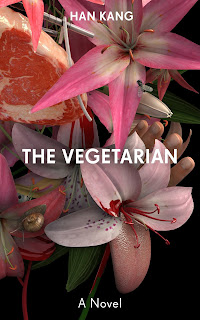Author: Han Kang
Publisher: Hogarth
Pages: 192
Format: Kindle
Source: Received from bloggingforbooks.com for review
Release Date: February 2nd, 2016
Description:
Before the nightmare, Yeong-hye and her husband lived an ordinary life. But when splintering, blood-soaked images start haunting her thoughts, Yeong-hye decides to purge her mind and renounce eating meat. In a country where societal mores are strictly obeyed, Yeong-hye's decision to embrace a more “plant-like” existence is a shocking act of subversion. And as her passive rebellion manifests in ever more extreme and frightening forms, scandal, abuse, and estrangement begin to send Yeong-hye spiraling deep into the spaces of her fantasy. In a complete metamorphosis of both mind and body, her now dangerous endeavor will take Yeong-hye—impossibly, ecstatically, tragically—far from her once-known self altogether.
A disturbing, yet beautifully composed narrative told in three parts, The Vegetarian is an allegorical novel about modern day South Korea, but also a story of obsession, choice, and our faltering attempts to understand others, from one imprisoned body to another.
My thoughts:
Before I started writing this review, I typed “being vegetarian in South Korea” to see what came up. According to twoatomsinamolecule.wordpress.com, Korean food has a lot of meat in it, and it’s mostly side dishes that are vegetarian-friendly. The owner of the blog talks about how problematic it is to be on a vegetarian diet living in South Korea and shares survival tips. Maybe this kind of thing is why Yeong-hye’s going vegetarian made her get into big, big trouble…
In her husband Mr. Cheong’s eyes, Yeong-hye is a regular woman without any qualities that pop: she’s not beautiful, not sexy, doesn’t really have any qualities to speak of. The one thing that makes her different from other women is that she chooses not to wear a bra (and you’ll know how she came make that decision as the story progresses). She can manage the house well, and this is enough for Mr. Cheong who seems to limit himself when it comes to wanting to get more out of life. However, after a dream she has, Yoeng-hye goes vegetarian. Her entire family is against this, and it comes to the point where her father forces meat down her throat as her sister In-hye and Mr. Cheong hold her arms down.
The book is in three parts, and we see how what people have is very different from what they actually want, how when they are so suppressed when it comes to taboos and how they explode at certain points. Mr. Cheong, for example, keeps lusting after his sister-in-law. In-hye’s husband, on the other hand, is lusting after Yeong-hye. The events that start to unfold with Yeong-hye’s declaration about vegetarianism only get weirder and weirder afterwards. At one point, Mr. Cheong forces himself on his wife, and then, at another point, we see In-hye’s husband using Yeong-hye in an art film he’s making at the end of which they end up having sex.
I don’t have much knowledge about Korea except for some common historical facts, but I do think some situations in The Vegetarian are reflections of the country’s cultural and moral values. For example, Mr. Cheong is very worried when he has to take his wife to a business dinner. And his worries come to life, too: how can there be a braless woman refusing to eat meat at the dinner table?! In-hye’s husband, on the other hand, draws flowers on both Yoeng-hye and himself for the art video, and they end up having sex like that. And what’s In-hye’s first reaction when she catches them the next morning? To call the mental hospital!
All these events do add up to Yoeng-hye ending up at the mental hospital, questioning, “Is it such a bad thing to die?” However, what I kind of got stuck on is the kind of “if your father says eat, you eat” kind of dialogues. As far as I can see, Korean women are expected to do the house work, bow to their husbands and other men in the family, acting like silent dolls.
The Vegetarian is about how people are afraid of the different, how those who try to be themselves are alienated, how some people have to choose between themselves and their families in order to live life the way they see fit. It’s a magical, yet dark book, so handle with care.



